上海新世纪英语8年级上英语辅导讲义-Unit 2
《课程讲解》-8上Unit2复习课件 (2)

We're here to discuss Ann's joining the club. 我们在这儿碰头是为了探讨安参加俱乐部的事。 We discussed what to do. 我们讨论了该做些什么。
4. Some students p_l_a_y_b_a_s_e_b_a_l_l after school and theyp_r_a_c_t_ic_e_h__a_rd_ every week.
spend less time doing homework at most be like
near the end of… discuss sth with sb the number of… have a monthly test look through the rest of… have…off
自学反馈
重点突破
at most
at least keep doing sth
bring in in the same way
自学反馈
重点突破
What's
like
Near the end of
discuss
listens carefully to offers me help
the fewest
have more weeks off
the fewest
the most + (countable, uncountable) nouns.
the least
Daniel
Unit 2 School life
1.I __h__a_ve__t_h_e__f_e_w_e_s_t___ . 2. Millie _____h_a_s_t_h_e__l_e_a_s_t__. 3. Kitty ______h_a_s__t_h_e__m_o_s_t______. eggs
牛津上海8年级上册Unit1-Unit2重要知识点及语法点复习

U1-U2Unit1 重要知识点复习词汇1会计______________2志向______________3棒球运动______________4最好的______________5大学;学院______________6角______________7梦想______________8在……期间______________9随函(或包裹)附上______________ 10高度______________11喜爱,有兴趣______________12或许;可能______________13米;公尺______________14在附近______________15拥有______________16物理学______________17很可能;大概______________18屋顶______________19滑雪______________20乒乓球运动______________21领带______________22标题;题目______________23(综合性)大学______________【语块归纳】1.own v.拥有n.独自on one’s own= by oneselfadj.自己的I have my own car.2.German n.德国人;德语Germany n.德国【注意】国籍和国人,国人变复数口诀:中日不变英法变,其余都要加s。
Chinese, Japanese, British man, French man, Canadian(s)3.maybe= possibly= probably adv.可能地【拓展】maybe和may be的区分:Maybe为副词,一般放在句首Maybe you are right.May be为情态动词+动词原形You may be right.4.near adj./ prep.附近的【反义词】far adj.远的be far away from 距离……远的【辨析】nearly adv.几乎nearby adj.附近的(一般作后置定语)There is a shop nearby.语法(一)不定冠词a.an的用法不定冠词a.an均可表示“一”、“一个”,一般用于以下几种情况中:1. 用于可数名词的单数形式前,指人或事物的某一种类。
沪教版英语八年级上册精品教案Unit 2 Listening and Speaking
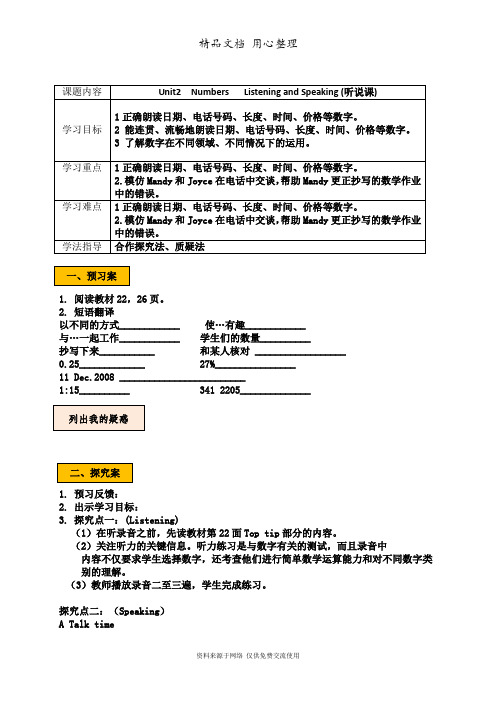
1. 阅读教材22,26页。
2. 短语翻译以不同的方式____________ 使…有趣____________与…一起工作____________ 学生们的数量__________抄写下来___________ 和某人核对 __________________0.25_____________ 27%________________11 Dec.2008 _________________________1:15__________ 341 2205______________1. 预习反馈:2. 出示学习目标:3. 探究点一:(Listening)(1)在听录音之前,先读教材第22面Top tip部分的内容。
(2)关注听力的关键信息。
听力练习是与数字有关的测试,而且录音中内容不仅要求学生选择数字,还考查他们进行简单数学运算能力和对不同数字类别的理解。
(3)教师播放录音二至三遍,学生完成练习。
探究点二:(Speaking)A Talk time1.播放教材第26页表格中11个单词重读和弱读的录音,学生跟读。
2. 回顾第一单元语音语调部分句子重音的相关知识,即冠词,人称代词,介词,助动词或情态动词,be 动词,连词等虚词在句子中要弱读。
3. 学生观察教材第26页例句中虚词的读音变化。
4. 教师帮助学生归纳朗读句子时要注意的弱读规则。
B Speak up1.学生朗读Speak up 部分的算式。
2. 学生观察教材第27页的插图,朗读电话用语。
3.向学生说明:在电话用语中,通话双方通常不用I 和you 来称呼,而是用This is...来表明身份,用Is that ....?来询问对方身份。
4.播放Speak up 部分的对话录音,学生跟读对话。
学生认读和理解单词check,copy,correctly 和短语copy down.5.学生做对子活动。
模拟Mandy 和Joyce 在电话中交谈,帮助Mandy 更正抄写的数学作业中的错误。
初中英语新世纪版八上U2L1知识梳理修改稿
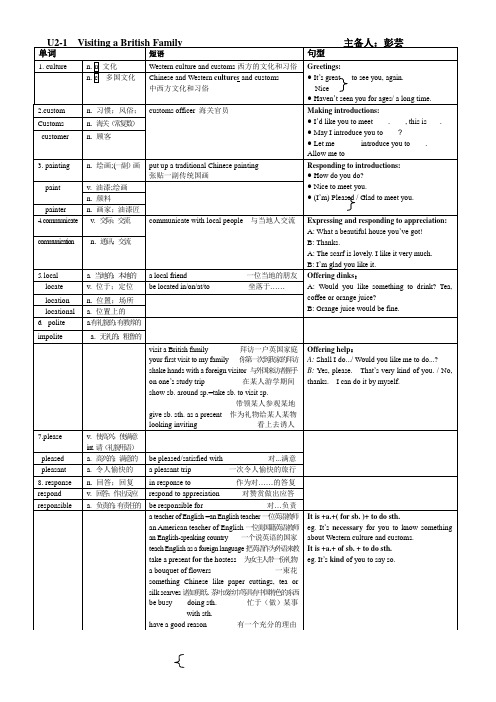
单词短语句型1. culture n. u 文化Western culture and customs 西方的文化和习俗 Greetings:● It ’s great to see you, again. Nice● Haven ’t seen you for ages/ a long time.n. c 多国文化Chinese and Western culture s and customs 中西方文化和习俗2.custom n. 习惯;风俗; customs officer 海关官员 Making introductions:● I ’d like you to meet ×××. ×××, this is ×××. ● May I introduce you to ×××?● Let me introduce you to ×××. Allow me toCustoms n. 海关(常复数) customern. 顾客3. painting n. 绘画;(一副)画 put up a traditional Chinese painting 张贴一副传统国画Responding to introductions: ● How do you do? ● Nice to meet you.● (I ’m) Pleased / Glad to meet you.paintv. 油漆;绘画n. 颜料painter n. 画家;油漆匠 4. communicate v. 交际;交流 communicate with local people 与当地人交流Expressing and responding to appreciation: A: What a beautiful house you ’ve got! B: Thanks.A: The scarf is lovely. I like it very much. B: I ’m glad you like it.com m unica tion n. 通讯;交流5. local a. 当地的;本地的 a local friend 一位当地的朋友Offering dinks :A: Would you like something to drink? Tea, coffee or orange juice?B: Orange juice would be fine. locate v. 位于;定位 be located in/on/at/to 坐落于…… location n. 位置;场所locational a. 位置上的 6. polite a.有礼貌的;有教养的impolite a. 无礼的;粗鲁的visit a British family 拜访一户英国家庭your first visit to my family 你第一次到我家的拜访 shake hands with a foreign visitor 与外国来访者握手 on one ’s study trip 在某人游学期间 show sb. around sp.=take sb. to visit sp.带领某人参观某地give sb. sth. as a present 作为礼物给某人某物 looking inviting 看上去诱人 Offering help :A: Shall I do.../ Would you like me to do...? B: Yes, please. That ’s very kind of you. / No, thanks. I can do it by myself.7.please v. 使高兴,使满意 int. 请(礼貌用语)pleased a. 高兴的;满意的 be pleased/satisfied with 对...满意 pleasant a. 令人愉快的 a pleasant trip 一次令人愉快的旅行 8. response n. 回答;回复 in response to 作为对……的答复respond v. 回答;作出反应respond to appreciation 对赞赏做出应答responsible a. 负责的;有责任的 be responsible for 对…负责a teacher of English =an English teacher 一位英语教师 an American teacher of English 一位美国籍英语教师 an English-speaking country 一个说英语的国家 teach English as a foreign language 把英语作为外语来教 take a present for the hostess 为女主人带一份礼物 a bouquet of flowers 一束花 something Chinese like paper cuttings, tea or silk scarves 诸如剪纸、茶叶或丝巾等具有中国特色的东西 be busy doing sth. 忙于(做)某事 with sth.have a good reason 有一个充分的理由It is +a.+( for sb. )+ to do sth.eg. It ’s necessary for you to know something about Western culture and customs. It is +a.+ of sb. + to do sth. eg. It ’s kind of you to say so.The adverbial clause of reason 原因状语从句1.since 意为“既然,由于”,用于双方都清楚的已知事实,相当于now that, 语气较because弱。
八上U2T2讲义
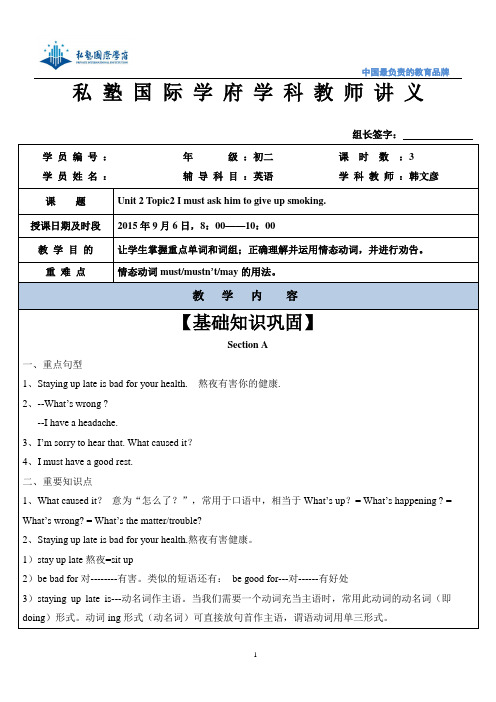
(2)enough作代词,意为“足够的东西”,
如:I have enough to do .我要做的事够多了。
【口诀】enough一词的位置,出“名”在前,幸福“(形”“副”)在后。
如:He has a serious disease in the lung.他有严重的肺病。
She ’t come because of illness.她因病不能来。
3、force sb. to do sth.强迫某人做某事。
4、once①adv曾经、一次。②conj,一旦,一......就......(相当于as soon as)
译成“可能”的还有must/might。
must是比较有根据的推测,把握性最强。
如:That must be his bike.His is black.
might表示推测的把握性比may更弱。
如:You might get a headache when you work too hard.
否定句中表示推测只能用can't。
如:The man in the room can't be him.He has gone to Beijing.
Exercise:
一、单项选择。
( ) 1.our English teacher is always very_________ and makes us feel________.
( )3.—Does the child need any help?
—No.She is________ to dress herself.
上海新世纪(五四学制)八年级英语第一学期:Unit 2 Lesson 1 Idioms with B

Lesson 1 Idioms with Body Part【教学目标】一、Knowledge and skills:1.Students can have a better understanding of the text by listening and reading it.2.Students can know the meaning of some idioms with body parts.3.Students can use some idioms with body parts in different cases.4.Students can know how to use the structures like “Does it / Do they mean…? What does it mean? It means… You mean…”二、Progress and Methods:1.Students can develop their abilities in learning independently, cooperation with others and sharing with others.2.Students can learn how to use the knowledge into practice.3.Students can develop their abilities in listening, speaking, reading and writing.三、Emotions and values:1.Students can arouse the interest of learning English.2.Students can develop the communicative skills about how to use the new words and phrases. 【学情分析】Most of my students are fond of English. Therefore, the most important thing which I should take into consideration is that how I can use different ways to arouse their further interest in English learning, for interest is the best teacher. Another mission is how to let my students get into a good habit of learning English. So in the class, I try to use a variety of teaching methods to make my lesson more vivid. In this way, students of all levels can get involved in the class. After a year’s training, the students’ abilities in learning English have been greatly improve d. Most of them participate in my classroom activities with great interest. As a result, the students as well as I are able to benefit a lot from the high efficient class.【教学重难点】Language focus: To know the meaning of some idioms with body parts.To learn how to use the structures.Difficult points: To grasp the use of the idioms with body part in different cases【教学过程】教学活动导入:Pre-reading preparation1.Sing an English song: If you’re happy and you know it2.Play a “Simon says…” game3.Read aloud the phrases.讲授:While-reading procedures1.Present the topicActivity 1 Share my storyAs a new member of SISU bilingual school, I was required to have an open class. I was wondering what kind of lesson I had to teach you. Also I was considering what teaching methods I could use to make my class easier and more vivid for you to learn. I had no idea.And then my workmates Miss Sun and Miss Shi came to me and gave me some useful advice. We discussed the lesson as soon as we were free last week. With the help of them, I completed my teaching plan in the end.Activity 2 Answer the questions(1)What can you learn from my story?(2)T: Very often, we need other people’s ideas and opinions when we want to do something well. This is because “Two heads are better than one.”What dose “Two heads are better than one” mean? It means 三个臭皮匠顶个诸葛亮(3)It is an idiom wi th the body part, isn’t it? (Lead in the topic: So our topic for today is “Idioms with Body Parts.”)Activity 3 Match the following pictures with the appropriate idioms.2.Practice on the textActivity 1 Picture talkingQ:(1)Who’s in the picture ?(2)What did students do as soon as the English class began? What are they talking about?(3)How many idioms have they discussed? Now let’s listen to the text and write down the idioms mentioned in the text.Activity 2 Listen to the text and write down the idioms.(1)He’s all ears.(2)You’ve got a sweet tooth(3)You’ve just hit the nail on the head(4)I see eye to eye with you.(5)I have a green thumbActivity 3 Read aloud the text and match the followings.__B_ (1)He’s all ears. A.You like eating food with sugar in it.__A_ (2)You’ve got a sweet tooth. B.He’s listening attentively.__D_ (3)You’ve just hit the nail on the hea d.C.I’m good at gardening.__E_ (4)I see eye to eye with you. D.You are right.__C_ (5)I have a green thumb. E.I agree with you.Check the answers like this:A: What does… mean?B: It means …Activity 4 More questions on the text.(1)How can we ask and express the meaning?(2)What do you think of the idioms with body parts?(3)Would you like to learn more idioms with body parts?Activity 5 Say out the idioms with body parts according to the situations given.(1)I don’t like talking to Jim because he gossips about others and can’t keep any secrets. Jim has a big (mouth)(2)The computer is ten thousand yuan. It’s so expensive. It costs an ________ and a ________. (arm, leg)(3)A: Hey, Jimmy. Your mum has come to see you.B: Are you kidding? My mum is now in Britain.C: Don’t believe him. He’s pulling your ________. (leg)(4)Since you’ve grown up, you ought to be independent. It means you should stand on yourown ________. (feet)(5)A: These words are very useful. You should memorize them.B: OK. I will learn them by ________. (heart)(6)A: I’m carrying a heavy box. Can you help me?B: I will surely lend you a ________. (hand)(7)A: Look, my glass is broken. You are clumsy.B: Sorry, I’m all ________. (thumbs)A: Never mind.Be careful next time.(8)Bob’s mother often tells him to work harder at his English. But he pays no attention to her words. Her words just go in one ________ and out __________. So Bob failed again in the exam. (ear, the other)Activity 6 Pair workA: What do I mean if / when I say …?B: You mean …A: Exactly / You’ve just hit….(1)She has a big mouth.(2)The car costs an arm and a leg.(3)You should learn these words by heart.(4)Could you lend me a hand?(5)You ought to stand on your own feet.(6)He’s pulling your leg.(7)The teacher’s words go in my ear and out the other.(8)He is all thumbs.7.Say out the idioms and their meanings according to the body parts.活动:Post-reading activitiesActivity 1 Group work: Form a group of four and make a dialogue after the model.Model:L: Let’s have a discussion about idioms with body parts, shall we?Ss: Yes, let’s.L: Let me set the ball rolling. It says “…” Who can guess its meaning?S1: It means …L: Right.S1: What do I mean if I say “…?”S2: You mean…S1: You’ve just hit…S2: I know some idioms, too. What do I mean when I say “…”S3: You mean …S2: Exactly.S3: Well, do you know the idiom –“…?”Students: It means …L: English idioms are so … that they can help us to...Shall we collect more on the Internet after class?Students: A good idea.Activity 2 Writing: write some sentences to describe a situation on your own. At the end of it, you should write down an idiom with the body part which is related to the situation.【作业布置】Assignment1.Read and recite the text.2.Collect more idioms with body parts on the Internet.。
上海八年级初二英语辅导讲义(教师版)
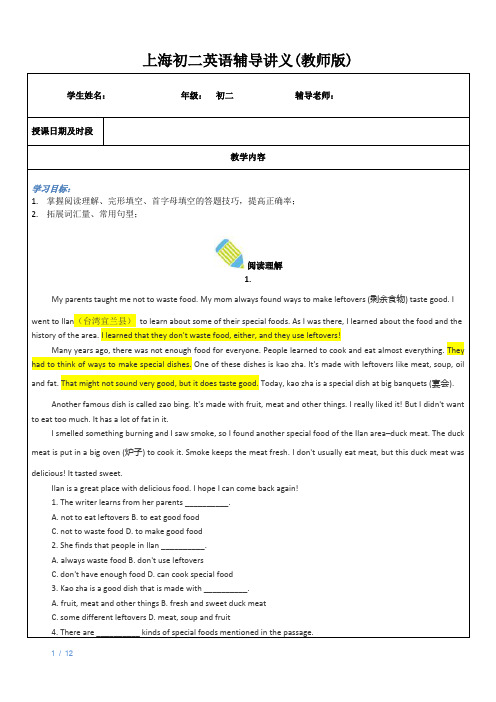
上海初二英语辅导讲义(教师版)学习目标:1.掌握阅读理解、完形填空、首字母填空的答题技巧,提高正确率;2.拓展词汇量、常用句型;阅读理解1.My parents taught me not to waste food. My mom always found ways to make leftovers (剩余食物) taste good. Iwent to Ilan(台湾宜兰县)to learn about some of their special foods. As I was there, I learned about the food and the history of the area. I learned that they don't waste food, either, and they use leftovers!Many years ago, there was not enough food for everyone. People learned to cook and eat almost everything. They had to think of ways to make special dishes. One of these dishes is kao zha. It's made with leftovers like meat, soup, oil and fat. That might not sound very good, but it does taste good. Today, kao zha is a special dish at big banquets (宴会).Another famous dish is called zao bing. It's made with fruit, meat and other things. I really liked it! But I didn't want to eat too much. It has a lot of fat in it.I smelled something b urning and I saw smoke, so I found another special food of the Ilan area─duck meat. The duck meat is put in a big oven (炉子) to cook it. Smoke keeps the meat fresh. I don't usually eat meat, but this duck meat wasdelicious! It tasted sweet.Ilan is a great place with delicious food. I hope I can come back again!1. The writer learns from her parents __________.A. not to eat leftoversB. to eat good foodC. not to waste foodD. to make good food2. She finds that people in Ilan __________.A. always waste foodB. don't use leftoversC. don't have enough foodD. can cook special food3. Kao zha is a good dish that is made with __________.A. fruit, meat and other thingsB. fresh and sweet duck meatC. some different leftoversD. meat, soup and fruit4. There are __________ kinds of special foods mentioned in the passage.A. twoB. threeC. fourD. five5. From the p assage, we know that __________.A. there was not enough food in Ilan long agoB. leftovers can't be used to cook delicious foodC. zao bing is a famous dish without any fat in itD. the writer is interested in very big banquets解析:1、C 这是一道细节理解题。
最新上海牛津版八年级上册同步讲义-8AU2 Work and play-学生版

Unit 2单元同步知识梳理&测试学生版【知识梳理】一、词汇Words1. expect (v.) 期待,期望expect sth. / sb.e.g. (1.) Farmers expect a good harvest.expect to do sth. / expect sb. to do sth. 期待去做某事e.g. (1.) He expects to finish the project in a week(2.) Do you expect me to stay for another week?expect that ……(从句)2. business[C]公司*start a new business[U]生意*He went to Beijing on business. (go to …… on business出差)How is your business? —Quite good.*Although he is my friend, business is business.(公事公办)businessman——businessmenbusinesswoman——businesswomen3. be similar to 和……相似4. different (adj.)不同的be different from 与……不同differently(adv.) 不同地difference [C] 不同之处e.g. (1.) Teenagers always think that their parents’ opinions are different from them.(2.) Can you tell me the difference(s) between the two words?(3.) In fact, these two books are quite similar. You can choose either of them.5. successful (adj.) 成功的successfully(adv.) 成功地success(n.) 成功 a great successsucceed(v.) 成功succeed in + n. /(doing) sth=be successful in+n/ doing sth=manage to do成功做某事He is a successful writer. He has successfully published more than 20 novels. Last month he succeeded in holding his first painting show. No wonder so many people admire his great success.6. must be 把握程度强(肯定是…)e.g. After a day’s hard work, you must be tired. 辛苦工作了一天,你肯定累了。
沪教牛津版-英语-八上-:Unit2教案1
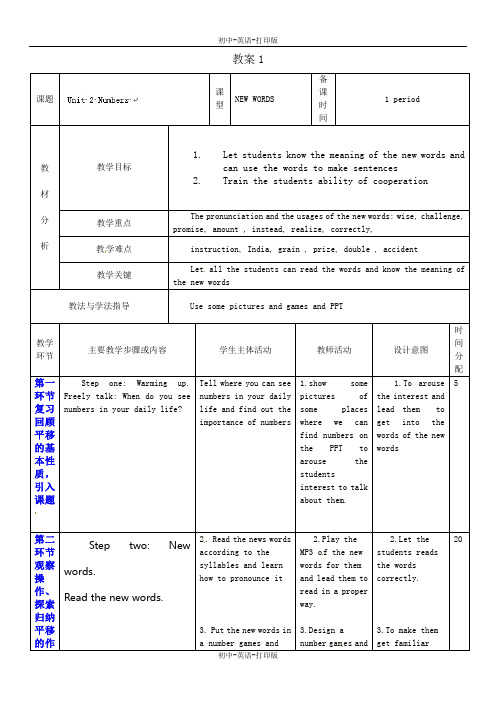
教案1课题课型NEW WORDS备课时间1 period教材分析教学目标1.Let students know the meaning of the new words andcan use the words to make sentences2.Train the students ability of cooperation教学重点The pronunciation and the usages of the new words: wise, challenge,promise, amount , instead, realize, correctly,教学难点instruction, India, grain , prize, double , accident教学关键Let all the students can read the words and know the meaning ofthe new words教法与学法指导Use some pictures and games and PPT教学环节主要教学步骤或内容学生主体活动教师活动设计意图时间分配第一环节复习回顾平移的基本性质,引入课题Step one: Warming up.Freely talk: When do you seenumbers in your daily life?Tell where you can seenumbers in your dailylife and find out theimportance of numbers1.show somepictures ofsome placeswhere we canfind numbers onthe PPT toarouse thestudentsinterest to talkabout them.1.To arousethe interest andlead them toget into thewords of the newwords5第二环节观察操作、探索归纳平移的作Step two: Newwords.Read the new words.2. Read the news wordsaccording to thesyllables and learnhow to pronounce it3. Put the new words ina number games and2.Play theMP3 o f the newwords for themand lead them toread in a properway.3.Design anumber gam es and2.Let thestudents readsthe wordscorrectly.3.To make themget familiar20法Step three: Play numbergames to remember thenew wordsStep four: Key wordslearning. play games .try to remember thenew words as quicklyas you can, with thehelp of the groupleader, then checkwith each otherwhether you rememberthe words or not .4. Work in groups tolearn the usage of thekey words, helpful ,anywhere, finally,nothing , arrive at,lead sb to , fallasleep , get down, byoneself, wake up5. match the new wordsand the pictu res shownon the pptplay a numbergames to helpthe studentswhen they havetrouble inreading the newwords4.Show the PPTof the meaningof th e key wordsand let ss makemore sentenceswith th e newwords5. check the wordsand give themmarks for thegroupswith thepronunciationand the spellin gof the newwords.4. Train thestudents’ability tocooperate. Letthe students indifferent levescan take part inthe activity.5.Provie thechances tostudents to showthemselves andpractice thespeakingability.Step five: have a competition第三环节课堂练习Step six: exercise1. use the correct forms ofthe words to fil l in theblanks like :My mother doesn’t allow me____( go) out at night.6. Finish theexercise given onthe sheet.6.Collect themistakes in thestudents’exercise.6. to consulatethe usages ofthe new words10第四环节课时小结step SevenHow many words do youmaster?Write them down in yoursheet7. Remember the wordsyou learn and spellthem out7.Give them apiece of paperto write thewords.7.To de velop thestudents’ability of self–checking.5。
Unit2同步教案牛津上海版八年级上册英语

Unit2 Work and play同步教案一、知识框架二、知识梳理Ⅰ. Important words and phrases:Words:1. adj.成功的adv成功地n.成功v.成功【重点】成功做某事succeed in doing sth.= be successful in doing sth.= be able to do sth.= manage to do sth. 2. adj.幸运的,有好运的adv幸运adv.不幸地n.运气【拓展】a lucky dog 幸运儿3. n .销售,出售n. 销售额销售量n.(男)店员,4. adj.简单的,容易的adv.简单地,容易地5.v. 收集Ⅱ.重点词汇拓展12. drive v.驾驶;驱使drive sb. to sp. 开车送某人去某地drive sb. to do sth. 驱使某人去某地13.attend, join, join in, take part in辨析attend+会议attend the meeting/ classjoin+个人/团体join us, join the Party入党join in/ take part in+活动join in/ take part in activities 14.similar adj.相似的A be similar toB A和B相似A andB are similar inC A和B在C方面相似【形近词】familiar adj.熟悉的sb. be familiar with sth. 某人对某物熟悉的sth. be familiar to sb. 某物对于某人而言是熟悉的15.expect v.期待expect sth. expect (sb.) to do sth. 期待(某人)做某事look forward to doing sth. 期待做某事expectation n.期待16.popular adj.流行的be popular with/ among 在……中是流行的17.continue v.继续continue to do sth. 继续做某事(另一件事)continue doing sth. 继续做某事(原来的事)carry on= go on= continue 继续18.explain v.解释explain sth. to sb.向某人解释某事explanation cn.解释make an explanation to sb. 给某人一个解释19.energy n. 能量energetic adj.精力充沛的power n.权力powerful adj.强大的resource n.资源20.force n.(物理)力v. 强迫force sb. to do sth. 强迫某人做某事21.heat n.热,热度v. 加热【课堂小练】Ⅰ. 用所给单词的适当形式填空(错误率:掌握情况:)1. The bank refuses to accept _______________ for the mistake. (responsible)2. They were proud of their children’s _______________. (achieve)3. The children quickly got _______________ with staying indoors. (boring)4. It is _______________ to start a speech by thanking everybody for coming. (usually)5. Tom was still on his way to school, because he ______________ to catch the first bus. (failure)6. Tickets are on _______________ from the booking office. (sale)7. She is very clever and often do well in her _______________. (exam)8. The teacher _______________ the answers on the board yesterday. (write)Phrases:1. ride a motorcycle 骑摩托车2. play the piano 弹钢琴3. one of the top students in the city 市里优秀生之一4. have written several successful computer games已经写了几个成功的电脑游戏5. the manager of the company 公司的经理6. be responsible for sales 负责销售7. make phone calls to our clients on the way 在路上打电话给我们的客户8. some boring work 一些无聊的工作9. achieve A grades in all my subjects 各门学科都得A10. discuss the business over breakfast 早餐期间讨论公司业务11. fail an exam 考试不及格12. collect me from school 到学校接我13. attend Computer Club meetings 出席电脑俱乐部会议14. ask me to assist them 请我帮助他们15. continue doing sth. 继续做某事16. It is time for lessons. 上课的时间到了。
沪教版-英语-八上-unit 2 words 参考课件
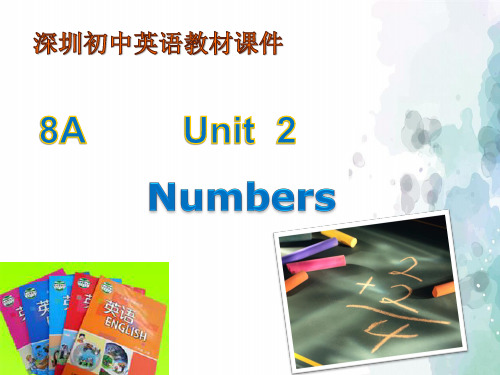
Step three: words classification
n.
number grain
instructions chessboard
gram
amount
son
rest
chess
gold
India
traffic
v. check challenge promise double realize
prize
奖赏;奖品 accident (交通)事故
v.
check challenge promise double realize copy
检查;核实 向(某人)挑战 许诺;承诺 (使)加倍 认识到;意识到 抄写;誊写
adj. wise
adv. instead correctly a long time ago
A. introduction B. instructions
C. invitation
2.The old man is _A_____ because he has
different ways to deal with different
problems.
A. wise B. brave
C. strong
2. I know the basic meaning and usage of these key words.
3. I can use these key words properly.
1. Read these new words for three times. 2. Preview the passage for reading.
every day. A
A. a lot of B. only a little C. many 7. I can see nothing but a book under the
初中英语新世纪版八上U2L2知识梳理修改稿

Grammar:I : so … that …1.用法:so...that 是连接结果状语从句的连接词。
表示如此……以至于能/不能。
常用的句型为:结构:肯定句: so+ adj. / adv. + that+ 主语+can/could do sth.否定句: so + adj./adv.+ that+主语+cannot/could not do sth.注意:1. 肯定句:so+ adj. / adv. + that+…转换成adj. /adv. enough (for sb.) to do sth.e.g. The hall is so big that it can hold 2000 people.→The hall is big ________ ________ hold 2000 people.否定句:so + adj./adv.+ that+主语+cannot/could not→adj. /adv. enough (for sb.) to do sth.→too + adj. / adv. (for sb) to do sth.太…以至不能e.g. Tony is so young that he can’t go to school.=Tony is_______ young________ go to school.=Tony is not ________ __________ to go to school.2.主从句人称不一致时,要加for sb.,e.g. The water is so dirty that I can’t drink it.The water is too dirty for me to drink.3. so+ adj. +a/an + n.+ thatsuch+ a/an + adj. + n. + thate.g. She is so good that all of us love and respect her.She is ______ a good teacher _______ all of us love and respect her.* many, much, little, few+ n. 时,只用so.e.g. I have _______ little money ________ I can't lend you any.4. 不定代词转换为too…to 句型时,Nobody /nothing anybody/ anythingNone of any ofNeither of either ofHe speaks so fast that nobody can catch him.He speaks _______ fast for _______ to catch.II : A few/few/a little/little的区别:1.few / a few用来修饰可数名词,few表示否定意义,没有,几乎没有;a few表示有肯定意思,有几个。
沪教八上unit2知识点

hundreds of students ten-thousand-word story
1/2 a half 1/4 one/a quarter 3/4 three fourths/quarters
其它数字相关
Lesson One = the first lesson Room 8 = the eighth room
enough enough 修饰名词,可前可后; 修饰形容词、副词,只能放在后面。
advice 不可数 a piece of advice
agree with agree to agree on agree to 同意/赞成…的意见,to 后面多接表示计划、建议、决定等的名词或代词 agree with 同意某人或某人所说的话,with 后面常接表示人的名词或代词 agree on (两人以上)就…取得一致意见,在…方面意见一致,其主语大多为复数形式,宾语只能是表示某件 事、计划等的名词或代词,而不是表示人的名词或代词。
……的数量
a number of + 可数名词复数 许多… 大量的….
begin to do sth. 开始做某事
would like would like sth. would like (sb.) to do sth.
基数词
one two … one/a hundred a/one thousand ten/one hundred thousand
hundred, thousand, million, billion 表示具体数字,用单数形式,后面加可数名词的复数; four hundred students
several hundred students
表示虚数,用复数形式,加“of”, 再加可数名词的复数; 与名词一起构成复合形容词时,用单数形式,名词亦用单数形式。 分数
八年级英语上unit2课文讲解

A figure of speech in which a word or phrase is applied to an object or action to which it is not Literally applicable
Iron
a contrast between what is stated and what is mean, or between what is expected to happen and what actually happens
The story revolves around two main characters, which relationships and interactions drive the plot forward
Setting
The story is set in a specific location, which adds to the atmosphere and creates a sense of reality
01
Introduction to the background and theme of the text
Background information
The text is set in a contemporary urban environment, reflecting on the lives and experiences of young people today
Verbs
Action words that express what the subject does or is
Nouns
Words that name people, places, things, or ideas
8年级新世纪上第二单元第二课公版讲义

卓越一对一精准导学课堂导学案学生姓名年级8 学科英语授课时间教师姓名郭福青课时4.He ___________ (he) to Beijing twice.5.My father _______ (be) a Party member for ten years.6.You can have a rest when you __________________ (get) home.7.If it ______________ (be) fine tomorrow, we'll go swimming.C. Choose the words or expressions and complete the passage. (选择最恰当的单词或词语,完成短文)Long ago, some people in Europe went to fight n war. Their war was in Asia. These people lost the war. But they ______1_______ with many new things.They_____2_____ back glass. They brought back silk. And they brought back spices.People in Asia had_____3_____spices for a long time. But before the war in Asia, people in Europe knew nothing about them. When they tasted spices on their food, they wanted more. But spices were hard to________4____________and because they had lost the war; people couldn't go to Asia by land. They had to find________5_______ways to get there. They looked for a way to go by sea.They did not find their way to Asia. But they found America. Many people left their own countries. They came to________6_________in America.( ) 1. A. went back B. came back C. came up D. took off() 2. A. gave B. bring C. got D. brought() 3. A. made B. eaten C. used D. produced() 4.A. use B. make C. get D. smell() 5. A. another B. some C. other D. any() 6. A. stay B. move C.leave D. liveD. Read the passage and fill in the blanks with proper words. (在短文空格内填入适当的词,使内容通顺,每格限填一词,首字母已给)Mingming has a cousin in Beijing. His name is Weiwei. They w______1____to each other every week. They tell each other about t h e i r life and school work. In his last letter, Weiwei i nv ited Mingming to visit Beijing, Here is Mingming's answer, Dear Weiwei,Thank you for your letter. I enjoyed r_______2______it very much. Thank you for i_____3_______me to visit Beijing.I have m__4____photographs of Beijing. I know there art' many interesting p____5______i n Beijing, such as Tian'anmen Square, he Summer Palace, the Great Wall and so on. So during the summer holidays, I’d like to travel to Beijing. Would you like to show me a_____6________Beijing? I will also visit uncle and aunt. We haven't seen each other for a long time, 1 miss you so much.I t h i n k we will have a good holiday.E. Answer the questions. (根据短文内容答复以下问题) (6分)Some farms are used to growing corns or wheat. On some farms, such animals as pigs or goats or turkeys are raised. But in China, a few years ago, scientists began a new kind of farm. It was a farm for raising shrimps.Shrimps belong to the same family as lobsters and crabs, These long thin sea animals have five pairs of legs. They swim backward.Fishermen use nets to catch this seafood. Sometimes the f is hi n g grounds are empty. In bad weather, fishing boats can not go to sea.Tin: Chinese scientists raised shrimps in large heated tanks, from very small eggs to large shrimps. Most shrimps are about three inches long. Shrimps raised in the tanks were nine inches long. It took six months for shrimps to grow in the tanks. But t h e t a n k s were never empty. And the scientists did not have to wait for good weather.So far, there arc a few shrimp farms. But some day there may be many shrimp farms around the world.1.What kind of farm did the scientists begin a few years ago?It was a farm______________________.2.How many legs does a shrimp have?。
上海新世纪英语八年级第一学期

1. A hobby can be almost anything a person likes to do in his s___________ time.2.My cousin is working hard in order to have a good c____________ of spoken English.3.Gas is a very efficient fuel. And w___________ more, it’s clean.4.I always s____________ my secrets with my good friends.5.My father always c____________ to me about my poor study.1.I think she’ll be ______________ as a photographer. (success)2.Cassidy gave a ______________ named “ The Future of Water Development.” (speak)3.People use more than words when they ____________ with each other. (communication)4.James was a fast ____________, and was soon better at tennis than his coach. (learn)5.I found this study trip was really _____________ and worthwhile. (reward)1.She tried hard to provide her child _______ a proper environment.a. /b. withc. ford. by2. My plan for the weekend is ________ a musical.a. seeb. to seec. seeingd. going to see3. Is Chinese _______ international language?a. ab. anc. thed. /4. In order to improve his own speaking skill, he trained _______ in public speaking.a. himb. hec. hisd. himself5. ________ is necessary to read the English newspapers in my spare time.a. Itb. Thatc. Hed. This6. Smoking is harmful to others as well as to you. You’d better ________.a. to give it upb. to give up itc. give it upd. give up it7. We will do your best _________ animals in danger.a. saveb. to savec. savingd. to saving8. ________ your success!a. Congratulationb. Congratulatec. Congratulations ond. Congratulate to9. She hopes ________ an exchange student.a. beb. beingc. to bed. will be10. If you don’t know the meaning of the word, you can ________ the dictionary.a. look forb. findc. consultd. guess from11. We planted many trees on ________ side of the street on Tree Planting Day.a. bothb. eitherc. everyd. all12. I _________ to read English novels and newspapers in my spare time.a. enjoyb. keepc. liked. practice13. –Could you tell me _______ you liked the study trip to New York?-I think it was enjoyable and worthwhile.a. whatb. howc. whend. where14. – Do you have any idea ______?-Perhaps they’re in the school library.a. where have they goneb. where have they beenc. where they’ve goned. where they’ve been1.I hope your dream _____________ (come) true.2.I don’t know if it ______________ (help)you become more sociable in the near future.3.I’m used to _____________ (think) in English now.4.It ___________ (be) a week since the National Treasures Exhibition ____________ (open) to the public.1.Hans studies English very hard. (改为否定句)Hans _____________ _____________ English very hard.2.Sue keeps an English diary to develop her writing skills. (对划线部分提问)___________ ___________ Sue do to develop her writing skills?3.Li Ming goes to the English Corner as often as possible. He wants to improve his speaking skills.(保持原句意思)Li Ming goes to the English Corner as often as possible in _________ __________ improve his speaking skills.4.I don’t know when we will leave for Britain. (保持原句意思)I don’t know when ___________ _____________ for Britain.5. The Internet has helped us so much that we can find the information we need more quickly. (保持原句意思)___________ the ____________ of the Internet, we can find the information we need more quickly.。
沪教版英语八年级上册精品教案Unit 2 Grammar

1. 写出下列基数词:1到30:40________50________60_________70__________80_________90_______100_____2.写出下列序数词:1到19:21到29:20_________30________40_________50________60________70________80_______1、预习反馈:2、出示学习目标:3、探究点一:一、基础词的概念:二、基数词的构成:(1)1-12是独立的单数,有各自的形式。
(2)13-19,除_______,_________,________为特殊形式之外,其余都是由其个位数形式后加_______后缀构成。
(3)20-99,表示整几十的单词中除______,________,________,__________,_________为特殊形式外,其余都是其个位数形式加后缀_______构成。
表示几十几时,在几十和个位基数词之间必须有连字符“-”。
例:21_____________,38_______________(4)100-999,整百数由1-9加hundred构成。
表示“几百几十”或“几百零几”在百们后加上______再加上十位和个位。
600_________________,301___________________,759_______________________ ________(5)1000以上,先将数字从右向左数起,每三位数加一个逗号“,”分隔。
从右开始,第一个“,”前的数字用thousand,第二个“,”前的数字用million,第三个“,”前的数字用billion.然后读数字时,从左向右三位数、三位数地读。
两个逗号之间最大的数为百位数形式。
7,540______________________________________63,247______________________________________235,756_____________________________________5,001,625_____________________________________42,631,457,008__________________________________Tip:(1)hundred,thousand,million被several或基数词修饰表示计数时不能用复数。
八上unit2讲义
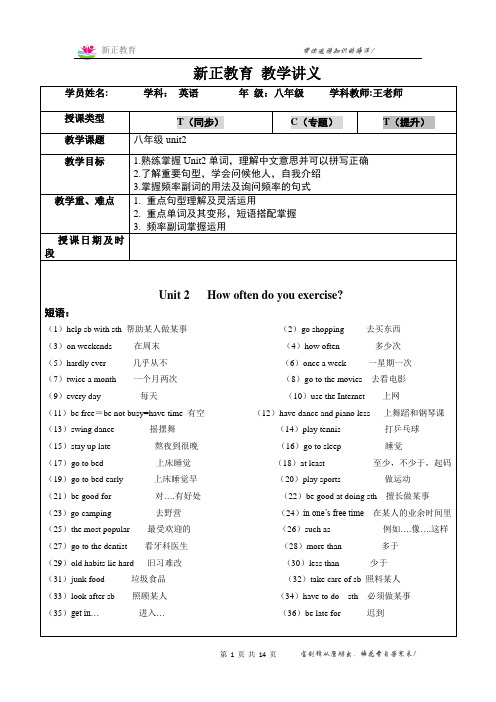
新正教育教学讲义15.point v.指;指向point to 指向;表明point at 指向16.free空闲的,有空的,反义词为busy.be free 有空,闲着,相当于have time.I‟ll be free next week. = I‟ll have time next week.17.How come?怎么会?怎么回事?表示某件事情很奇怪,有点想不通;可单独使用,也可引导一个问句,相当于疑问句why, 但how come 开头的特殊疑问句使用的仍然是陈述语序。
How come Tom didn‟t come to the party? = Why didn‟t Tom come to the party?18.stay up late指“熬夜到很晚,迟睡”。
Don‟t stay up late next time.stay up指“熬夜,不睡觉”。
He stayed up all night to write his story.19.go to bed强调“上床睡觉”的动作及过程,但人不一定睡着。
I went to bed at eleven last night.go to sleep强调“入睡,睡着,进入梦乡”。
She was so tired that she went to sleep soon.20.percent 百分数,基数词+ percent:percent 没有复数形式,作主语时,根据所修饰的名词来判断谓语的单复数。
Forty percent of the students in our class are girls. Thirty percent of time passed.21.more than 超过,多于,不仅仅,相当于over. 在句型转换中考查两者的同义替换。
反义词组为:less than. I lived in Shanghai for more than / over ten years.22. afraid形容词,担心的,害怕的,在句中作表语,不用在名词前作定语。
沪教版-英语-八上-unit 2 Reading2 参考课件

5.enough.....to....
enough 修饰名词放在前面: enough rice enough 修饰形容词放在后面:big enough enough... to do sth 足以做... 他有足够的钱去买房子。 He has enough money __t_o_b_u_y___a house. 那个男孩子足够大,可以上学了。 The boy is old enough ___to__g_o_t_o______ school.
The old man looked at him. "I can teach you how to make more money if you _p_r_o_m_i_s_eto follow my advice,"he said.
"The young man agreed. Then the old man took the young man to a window. "Look outside," he said.
double prize promise realize wise
A young man once talked to a __w__is_e___old man."I won a __p_r_iz_e___and have a little gold now, but I want much more," he said. "Can you help me?"
Self-assessment
1. I get further understanding of the text.
八年级上册Unit 2讲义

Unit2 How often do you exercise?单词housework ['haʊswɜːk] n.家务劳动hardly ['hɑːdli] adv.几乎不;简直不;刚刚ever ['evə(r)] adv.曾经;在任何时候once [wʌns] adv.一次;曾经twice [twaɪs] adv.两倍;两次Internet ['ɪntənet] n.因特网program ['prəʊɡræm] n.节目;程序;课程;节目单full [fʊl] adj.满的;充满的;完全的swing [swɪŋ] n.摇摆;秋千v.摇摆;旋转maybe ['meɪbi] adv.或许;也许;可能swing dance摇摆舞least [liːst] adj.最小的;最少的coffee ['kɒfi] n.咖啡;咖啡色health [helθ] n.健康;人的身体或精神状态result [rɪ'zʌlt] .结果;后果percent [pə'sent] adj.百分之...的online [ˌɒn'laɪn] adj.在线的adv.在线地television ['telɪvɪʒn] n.电视机;电视节目although [ɔːl'ðəʊ] conj.虽然;尽管;然而;可是through [θruː] prep.穿过;凭借;一直到body ['bɒdi] n.身体mind [maɪnd] .头脑;想法;意见;心思such [sʌtʃ] adj.这样的;如此的together [tə'ɡeðə(r)] adv.共同;一起die [daɪ] v.死;枯竭;消失writer ['raɪtə(r)] n.作者;作家dentist ['dentɪst] n.牙科医生magazine ['mæɡəziːn] n.杂志however [haʊ'evə(r)] adv.然而;无论如何;不管多么than [ðən] conj.比almost ['ɔːlməʊst] adv.几乎;差不多none [nʌn] pron.没有人;没有任何东西,毫无less [les] adj.更少的;较少的point [pɔɪnt] n.看法;要点;重点;小数点;目标;分数短语such as例如;诸如junk food n.垃圾食品;无营养食品at least至少at most最多hardly ever很少;几乎从不;难得junk food n.垃圾;废旧杂物more than超过;多于;不仅仅;非常less than不到;少于stay up (late)熬夜Leave``` for``离开某地去另一地方···1.how often意为“多久一次”,常用于对时间频率的提问。
- 1、下载文档前请自行甄别文档内容的完整性,平台不提供额外的编辑、内容补充、找答案等附加服务。
- 2、"仅部分预览"的文档,不可在线预览部分如存在完整性等问题,可反馈申请退款(可完整预览的文档不适用该条件!)。
- 3、如文档侵犯您的权益,请联系客服反馈,我们会尽快为您处理(人工客服工作时间:9:00-18:30)。
辅导讲义
课题名称新世纪英语8年级上 U1L2 补习2 讲义序号
教学目标►1 不定代词: somebody, someone, something,etc ►2 With pleasure非常乐意
►3 Do you mean...?
教学重点
难点重点:难点:
教学过程
Lesson Two Robots
【词形变换】
different(形)---difference(名)---differently(副)
danger --- dangerous
operate --- operation
memory --- memorize
industry --- industrial
medicine --- medical
please---pleasure(名)---pleased(形人)---pleasant(形物)【重要短语】
tidy up 整理,收拾
make the bed 铺床
perform/do an operation on sb. 给某人做手术
perform/do operations on sb. = operate on sb.
be different from与……不同be the same as与……相同know nothing about 对……一无所知
with pleasure 高兴地,快乐地;乐意地
what else = what other things (else常放在不定代词和疑问词的后面)decide to do sth. 决定做某事
practise doing sth. 练习做某事
not only…but also…不但……而且……
not…any more/longer = no more/longer不再
keep doing sth. 一直不停地做某事
不定代词的用法:
something 常用于肯定句中,也可用于希望得到对方肯定回答的疑问句中
anything 常用于否定句或疑问句中
nothing 常用于否定句中(what)
everything
上述不定代词都指物,不能和of连用,都是单数。
someone = somebody 常用于肯定句中
anyone = anybody 常用于否定或疑问句中
no one = nobody 常用于否定句中(who)
everyone = everybody
上述不定代词都指人,不能和of连用,也都是单数。
none既可指人也可指物,既可用作单数也可用作复数,常和of连用。
(how many)
1. 整理房间 2 . 为期末考试做准备
3 . 为……做准备
4 . 为……做准备
5 . 自己铺床
6 . 为……动手术
7 . 施行手术8 . 乐意地
9 . 与……不同10 . 与……不同
11 . 充满,挤满……的12 . 被……装满
13 . 作为结果,因此14 . 人
15 . 执行不同的工作16 . 看上去像普通机器
17 . 洗衣机18 . 帮助人们做许多事
19 . 在花园里帮忙20 . 帮助我们做家务
21 . 家用机器人22 . 助学机器人
23 . 工业用机器人24 . 医疗机器人
25 . 帮助我们学习26 . 指导某人学校的所有功课
27 . 太不可思议了! 28 . 机器人还能做些什么?
29 . 做危险而困难的工作30 . 你想要弄点东西吃吗?
31 . 你能为我做些事吗? 32 . 愉快地听音乐
33 . 做些类似于擦窗和拖地板的工作
34 . 从事机器人研究的科学家
35 . 帮助科学家在太空做试验
36 . 帮助警察控制交通
37 . 帮助消防队员灭火
38 . 帮助学生练习英语
39 . 有足够的时间娱乐自己
40 . 有足够的时间娱乐自己
41 . 不再
42 . 研制不同型号的机器人
43 . 在满是灰尘的地方工作
44 . 照顾病人
45 . 做各种各样的工作
46 . 做所有的家务活
47 . 有许多的优点
48 . 持续工作很长时间
49 . 变得疲劳
50 . 害怕危险和
困难的工作
51 . 对人类来说他们是
多好的朋友啊!
52 . 在温暖而洁净的地方工作
53 . 你成功的秘密
54 . 一些,另一些,还有一些
55 . 一个,另一个,第三个
56 . 一直练习英语
57 . 各种各样的使用者
58 . 一种新型机器人
1 . tidy up rooms
2 . prepare for the final examination
3 . get ready for
4 . be ready to
5 . make the bed oneself
6 . operate on
7 . perform an operation
8 . with pleasure
9 . be different from
10 . be not the same as
11 . be full of
12 . be filled with
13 . as a result
14 . human beings
15 . carry out different jobs
16 . look like ordinary machines 17 . washing machine
18 . help people do many things
19 . help work in the garden
20 . help us with the housework
21 . a home-help robot
22 . robots for study
23 . industrial robots
24 . medical robots
25 . help us study
26 . tutor sb in all school subjects
27 . That’s fantastic !
28 . What else can robots do ?
29 . do very dangerous and difficult jobs
30 . Would you like something to eat ?
31 . Can you do something for me ?
32 . listen to the music with pleasure
33 . do jobs like cleaning windows and sweeping the floor
34 . robotic scientists
35 . help scientists do experiments in space
36 . help policemen control traffic 37 . help firemen put out fires
38 . help students practise English
39 . have enough time to enjoy oneself
40 . have enough time to enjoy oneself
41 . not …any longer
42 . develop different types of robots
43 . work in dusty places
44 . look after patients
45 . do all kinds of jobs
46 . do all kinds of housework
47 . have many advantages
48 . keep working for a long time
49 . get tired
50 . be afraid of dangerous
and difficult jobs
51 . What good friends they are to human beings!
52 . work in warm and clean places
53 . the secret of your success
54 . some,others,still others
55 . one,another,the third
56 . keep practising English
57 . various users
58 . a new type of robot
课堂回顾
课后作业
日期:__________________。
